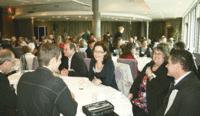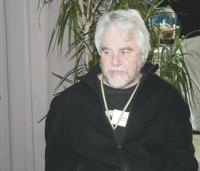Sian Owen rsj and Cecily McNeill
3 May 2011
The right to die with dignity – an increasingly common call from the pro-euthanasia lobby – was upended when a leading ethicist told a euthanasia conference last month being allowed to die naturally is dying with dignity. ‘They haven’t lost [human dignity] because they remain human.’
Professor Margaret Somerville, founding director of the McGill Centre for Medicine, Ethics and Law at McGill University, Canada, said advocates for euthanasia were deliberately confusing a person’s right to adequate pain relief with a perceived right to choose the time and manner of death.
She told ‘The Euthanasia Debate – Why Now?’ Conference on April 8, ‘People in pain have a right to fully adequate pain relief treatment. But that does not entail endorsing euthanasia as pro-euthanasia advocates propose.’
 The conference attracted nearly 100 people to Icon Te Papa to hear a range of challenges regarding euthanasia and its effect on society. Doctors including 12 palliative medicine physicians, religious leaders, teachers, and pastoral workers from throughout the country came to hear presentations of the philosophical, ethical and cultural perspectives on euthanasia, an issue often presented narrowly in the media. It was an opportunity to be informed, to participate in conversation and to look at this critical issue with new eyes.
The conference attracted nearly 100 people to Icon Te Papa to hear a range of challenges regarding euthanasia and its effect on society. Doctors including 12 palliative medicine physicians, religious leaders, teachers, and pastoral workers from throughout the country came to hear presentations of the philosophical, ethical and cultural perspectives on euthanasia, an issue often presented narrowly in the media. It was an opportunity to be informed, to participate in conversation and to look at this critical issue with new eyes.
The room was full of energy as time was taken to share responses to the input from presenters representing a range of backgrounds. In an effort to canvass a broad array of ideas the sessions moved briskly from the opening address by Professor Somerville to Don Mathieson QC who ended the presentations with an overview of the legal implications of euthanasia legislation in New Zealand.
Intention is key
The issue in the pro-euthanasia debate, Dr Somerville said, is how we die. To withdraw life-support systems is allowing the patient to die naturally of their illness. In euthanasia the cause of death is the lethal injection. The physician’s intention is to kill the patient rather than the pain.
But, Professor Somerville said, the case against euthanasia is complex in our secular society where it used to be simply a matter of obeying the fifth commandment.
To counter calls for euthanasia to be legalised, we need to embed euthanasia in a moral context. What would legalising euthanasia do to the value of life?
When abortion was legalised, Dr Somerville said, there was a great deal of agonising over each case. Now abortion has become widely accepted and is even sometimes used as a contraceptive and this will happen with euthanasia.
‘The medical authority of Oregon (where physician-assisted suicide is legal) seems to have accepted cost saving as a justification [for euthanasia]: It “has acknowledged that when it turns down an application to cover the cost of an expensive new drug, it sends out simultaneously a reminder to the patient or applicant that the state’s assisted suicide program is available at an affordable cost”.’
‘Maintaining a moral context is crucial in light of an aging population and scarce, expensive healthcare resources which will present many difficult decisions about who lives and who dies.’
Loneliness a big fear
There is nothing new about becoming terminally ill but dying alone or unloved is a universal human fear.
There’s work going on now to try to find out what dying people need.
For example one of the world’s leading psychiatrists Dr Harvey Chochinov has just, with his team, developed what they call ‘dignity therapy’.
They have found that certain things, such as the absence of pain and a sense of hope, allow us to die more peacefully. ‘Hope is a sense of connection to the future – to wake up in the morning and see the dawn, or a visit from a loved one or a friend – so people are working now on what they call these ‘mini-hopes’.
‘We also know that people can review their life and feel that it was worthwhile and had meaning – this helps them to die peacefully.
‘People who work with the dying suggest they write a short story of their life. They ask them if they would like to give it to a special person.
‘I believe that hope is the oxygen of the human spirit.
‘We must reject the idea that “When you are past your ‘use by’ or ‘best before’ date, you should be checked out as quickly, cheaply and efficiently as possible” if we are to retain our humanity.’
 Dr Martin Sullivan of Massey University explored the concept of a ‘life worthy of life’. Questions about where the expertise resides to make judgments about the worth of life were raised and throughout his address Dr Sullivan challenged listeners as members of the disabling society to consider the vulnerability many disabled people hold when the topic of euthanasia is raised.
Dr Martin Sullivan of Massey University explored the concept of a ‘life worthy of life’. Questions about where the expertise resides to make judgments about the worth of life were raised and throughout his address Dr Sullivan challenged listeners as members of the disabling society to consider the vulnerability many disabled people hold when the topic of euthanasia is raised.
Tohunga Te Ao Māori Amster Reedy, noted that traditional Māori society held no construct for euthanasia.
Sydney Palliative care physician Dr Frank Brennan’s use of narrative to explore the role of palliative care was moving, encouraging and stimulating. Dr Brennan stressed that human dignity is not dependent on circumstances and situations but is intrinsic to being human.
Emeritus Professor David Richmond warned that euthanasia may be defined by politicians who have little understanding of the complexities of natural death and the differences that intent makes to the provision of care. This was also a concern for Dr Chris Perkins director of the Selwyn Centre for Ageing and Spirituality who spoke of the challenges when words such as dementia and depression are confused in terms of aged care.
A panel discussion at the end of the day enabled participants to consolidate and integrate the ideas they had heard during the day.
Hospice New Zealand and the Nathaniel Centre are to be congratulated for coordinating a series of overwhelmingly thought-provoking lectures.
Images: Delegates discuss the questions they would like to put to the previous speaker at the Euthanasia Debate.
Lower: Dr Martin Sullivan of Massey University